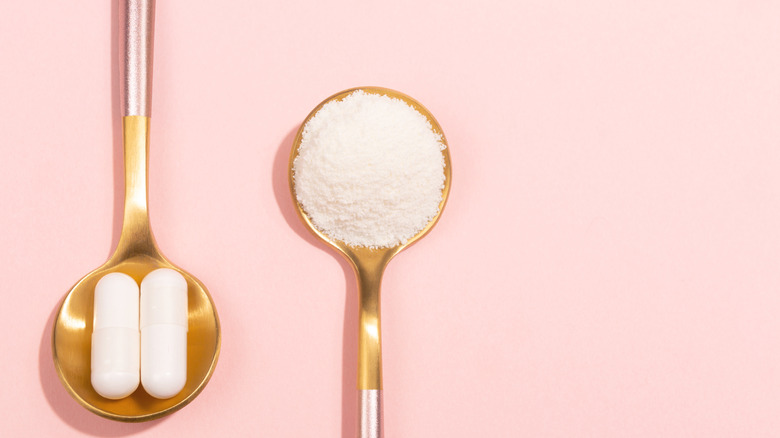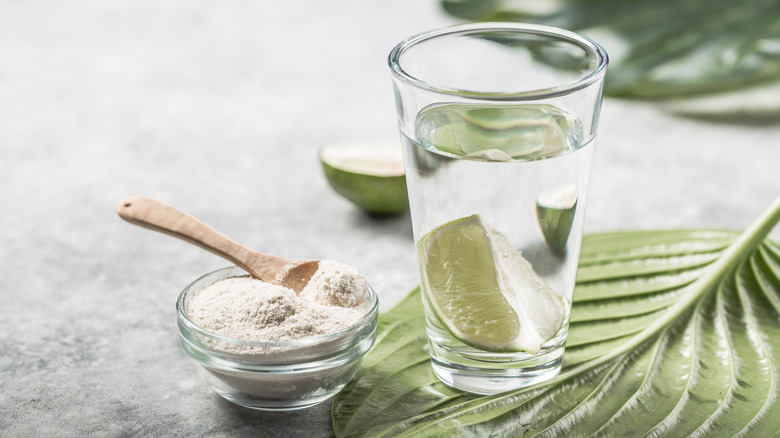Here’s What Taking Collagen Can And Can’t Do For You

Sometimes it feels like there’s a constant flow of new must-have supplements to try, and it can be confusing to decide which are worth your time or not. For one, you might have recently jumped aboard turmeric’s major health-boosting benefits, long-touted by Ayurvedic and Chinese medicine for its benefits on the skin, allergies, and the digestive system (via NCCIH), or the cortisol-level-inhibiting medicinal super-herb ashwagandha, another Ayurvedic powerhouse (via Cleveland Clinic). While supplements are an integral part of any lifestyle for overall wellness, it can still be difficult to pick and choose which are best for you. Of course, that includes celeb-approved collagen, one of the latest “must-have” supplements on our radar.
Other herbs and supplements recently gaining traction? Elderberry and ginger for immune system support, magnesium for stress, and vitamin D to help fight chronic disease (via Healthline). Still, beauty-boosting collagen is everywhere right now, with Kelly Ripa adding some to her water every morning, and Busy Phillips swearing by her daily collagen-infused coffee (via Kollo Health). Whether you’re already mixing collagen powder into your A.M. drink, or just starting to get curious about it now, it’s quickly securing a spot as the vitamin to know. Whether you need some help in the glow department, you feel constantly dehydrated, or you want to feel a youthful boost in your day-to-day, collagen can put some pep in your step. Still, it’s not a miracle worker, and there are some things it just can’t do. Here’s everything you need to know.
It's a one-stop shop for glowy skin, thick hair and stronger nails

First up, one of collagen’s most crucial benefits is its glow-boosting powers, keeping celebrities like Kate Hudson, Jennifer Aniston and Kourtney Kardashian coming back for more (via Kollo Health). And it’s all down to science: as per WebMD, collagen is a protein produced by the body that can be found in your skin, muscles, blood, and bones, forming the building blocks of vitality through amino acids. Collagen contributes to skin health, and losing it as you age means a less glowy complexion, crepiness, and wrinkles. It’s no wonder celebs are obsessed with collagen supplements — and it might just be the holy grail behind those seriously-perfect red carpet appearances.
According to Everyday Health, scientific trials have proved collagen’s wonderful effects on the skin, making it a perfect anti-aging ritual. A 2019 study in the Journal of Drugs in Dermatology that tested 800-plus people showed that taking at least 10 grams of collagen a day undoubtedly benefits the skin. Participants taking collagen saw an improvement in skin hydration, less propensity to wrinkling, and incredibly enough, even wound healing. Moreover, WebMD mentions a recent study that shows collagen can thicken hair and prevent hair loss, while another study proved that the supplement could lead to improved nail strength and growth in women. There’s clearly something to the current trend of mixing collagen powder in coffee every morning, or blending it into açaí bowls or protein smoothies — and we’re on it!
However, it's not a quick fix

Now that we went through collagen’s most jaw-dropping superpowers, we have to be honest: it won’t work immediately. While you may be looking forward to taut, wrinkle-free skin stat, daily collagen powder mix-ins or vitamins aren’t going to make a noticeable difference that quickly. As per Mind Body Green, collagen can begin to improve skin in the first one to three months, but can vary from person to person. Nails will start to grow longer and thicker after around six months, while it’s still unclear how long it takes to show an effect on hair.
According to the New York Times, taking collagen supplements must be a “committed relationship” in order to see results, and you have to take them every day to keep reaping its benefits. Unfortunately, you can’t take collagen for a few months and expect to keep its effects long-term: dermatologist Dr. Debra Jaliman explained to the outlet that we produce collagenase, an enzyme that consumes collagen over time. That means that the supplement’s glowy effects will only last as long as you stir in the powder in a smoothie every morning — and will fade as soon as you stop.
Healthline mentions a study that showed women should take collagen for at least two months to see a difference in skin tightness and hydration, while another study calculates it takes around three months to see less wrinkles. The benefits are clear — it just takes a few months to get there!
It can improve joint and bone health

While collagen is best known for its beauty-centric benefits, it’s a game-changer for overall health. More than skin deep, the supplement can actually improve joints and prevent osteoporosis, a top priority once collagen starts decreasing with age (via Healthline). As referenced by Hims, a study of athletes showed that taking 10 grams of collagen a day could alleviate joint pain, a breakthrough that showed the supplement is a must-have for regular gym-goers.
As dermatologist Dr. Shari Marchbein explained to the New York Times, collagen is “the main structural protein that forms the connective tissue throughout our body, from skin to bones,” comprising “tendons and ligaments.” It’s little wonder taking collagen every day can form the basis for continued joint and bone health throughout the aging process, keeping you active for longer. The outlet cites a study that showed taking collagen is linked to stronger bones less susceptible to breaking, with a decrease in back and knee pain, too.
According to Healthline, taking collagen might even give a push to your tissues to make more of it, and can decrease bodily inflammation. However, it’s important to note that Mind Body Green cites a trial that found collagen’s effects on joint pain inconclusive. Still, it also describes a study that showed that overall mobility while active was greatly improved by taking collagen for 180 days. While everyone’s bones are different, if you deal with joint pain often, collagen might be the antidote you’re looking for.
It probably won't speed up your metabolism

Back to the “bad,” or at least what collagen probably won’t do for you: speed up your metabolism, or help you lose weight if that’s in your plans. If you’re looking to take collagen for possible slimming benefits, several outlets assert it’s not likely to work. As per Healthline, although some purporters take the supplement for weight loss, no studies have found a surefire link. Hims agrees, explaining that although influencers and celebs alike insist collagen is the perfect gym buddy for extra fat burning, that couldn’t be further from the truth. As per the outlet, collagen is definitely “not a stimulant” and will not alter your metabolism in any way, so your weight isn’t likely to change after taking it.
Still, as per Hims, there’s one way collagen can indirectly contribute to weight loss: it makes some people feel fuller after eating. This is the reason many people take their supplements with meals, or go for collagen-rich foods come lunch and dinner time like fish, egg whites, leafy greens, cashews, and avocados (via Medicine Net). Incorporating collagen vitamins or mixable powders in your diet isn’t likely to make you slimmer, but its reported effects on fullness after meals might do the trick. Everyday Health puts it simply: like with all proteins, collagen makes for a healthier diet overall, and can contribute to wellness. But it’s not a miracle pill, and eating lean proteins, vegetables, fruit, and unrefined carbohydrates is still crucial.
However, it can help increase muscle mass

Collagen isn’t perfect, but it can assist you with your fitness goals by increasing muscle mass over time. According to Everyday Health, the body needs collagen to build muscle, and as per Hims, collagen works like any other protein supplement to increase muscle mass and strength. In fact, the outlet cites collagen as “a good source of protein,” and is an excellent companion to your regular weight training routine at the gym.
While you probably shouldn’t nix your go-to protein powder for collagen completely, instead opting for a mix of both, Hims cites several studies that show collagen has worthwhile effects on muscle mass. For example, a 2015 study showed that taking 15 grams of collagen directly after exercising for a total of three months can contribute to an increase in muscle and overall strength. Healthline explains that collagen makes up between one to 10 percent of muscle mass, so it makes sense that taking it as a supplement can contribute to serious gains. Although research shows that those who most benefit from collagen’s incredible effects are people who have lost muscle due to aging, any age group is likely to see a noticeable difference.
Mind Body Green estimates that it should take about three months to see collagen’s effects on muscles, and only when combined specifically with a resistance training program. While collagen won’t build muscle from watching Netflix on the couch (if only!), it works effectively when taken alongside daily gym sessions.
What it probably won't affect? Your anxiety or gut

Collagen is best used for benefits related to your skin, bones, or muscles, much less for aiding gut balance or anxiety. As drawn out by Healthline, there is no evidence from research that shows collagen can increase gut health or alleviate the symptoms of leaky gut syndrome, which is an issue in the small intestine that can cause bloating and cramps (via WebMD). Some purporters insist collagen is a great natural alternative for healing a leaky gut, but the jury’s still out on whether it can affect the gut at all.
As per Hims, collagen does make up a portion of your gut. Mind Body Green also explains that collagen is partly made up of the amino acid L-glutamate, which nurtures cell growth in the small intestine. While this may help build up your intestinal lining, Hims asserts that no studies have found a link between collagen and repairing the gut, so it probably won’t help gastrointestinal discomfort.
Further, collagen is not likely to help your anxiety, although some supporters cite the supplement as a great source for brain wellness. According to Healthline, no studies have shown that collagen helps brain-related issues, and as per Weight Watchers, taking the supplement in lieu of other proteins might contribute to a decrease in tryptophan, which is related to serotonin. This means replacing your protein powder with just collagen might actually make you feel more anxious, so tread with caution.
Collagen is heart-healthy

We’ve outlined most of collagen’s benefits and all the bodily functions it’s not likely to affect, which WebMD unfortunately says also includes eczema, dermatitis, and acne. But there’s one advantage to collagen you might not be expecting at all, and it starts with the heart. While it’s still most important to keep a heart-healthy diet of lean proteins like small portions of fish and chicken, along with a good amount of fruit and vegetables, research shows that collagen might benefit the heart’s arteries.
As cited by Healthline, a recent study tested 31 adults taking 16 grams of collagen a day for six months, finding a clear increase in heart health. Overall, arteries became less “stiff,” which is most likely related to how collagen makes up part of arteries’ protein composition. Science Daily explains that stiff arteries can be a source of heart disease, so keeping them “supple” can prevent this. According to Healthline, arteries experience a decrease in function as collagen declines, which echoes the study’s findings. Plus, the trial showed that collagen can increase high-density lipoprotein cholesterol by 6%, which is actually a good thing — as per Mayo Clinic, HDL is tied to less likelihood of cardiovascular disease. Since HDL breaks up and carries away cholesterol into the liver for eventual removal from the body, this is a major collagen-related benefit.
According to Everyday Health, collagen can also help make blood vessel walls stronger, which may help the heart in the long run.
Source: Read Full Article


